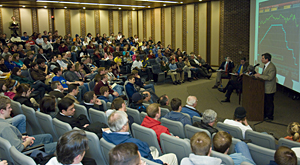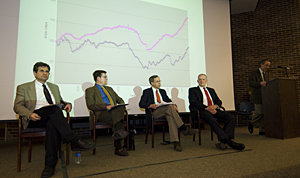

- Rozovsky wins prestigious NSF Early Career Award
- UD students meet alumni, experience 'closing bell' at NYSE
- Newark Police seek assistance in identifying suspects in robbery
- Rivlin says bipartisan budget action, stronger budget rules key to reversing debt
- Stink bugs shouldn't pose problem until late summer
- Gao to honor Placido Domingo in Washington performance
- Adopt-A-Highway project keeps Lewes road clean
- WVUD's Radiothon fundraiser runs April 1-10
- W.D. Snodgrass Symposium to honor Pulitzer winner
- New guide helps cancer patients manage symptoms
- UD in the News, March 25, 2011
- For the Record, March 25, 2011
- Public opinion expert discusses world views of U.S. in Global Agenda series
- Congressional delegation, dean laud Center for Community Research and Service program
- Center for Political Communication sets symposium on politics, entertainment
- Students work to raise funds, awareness of domestic violence
- Equestrian team wins regional championship in Western riding
- Markell, Harker stress importance of agriculture to Delaware's economy
- Carol A. Ammon MBA Case Competition winners announced
- Prof presents blood-clotting studies at Gordon Research Conference
- Sexual Assault Awareness Month events, programs announced
- Stay connected with Sea Grant, CEOE e-newsletter
- A message to UD regarding the tragedy in Japan
- More News >>
- March 31-May 14: REP stages Neil Simon's 'The Good Doctor'
- April 2: Newark plans annual 'wine and dine'
- April 5: Expert perspective on U.S. health care
- April 5: Comedian Ace Guillen to visit Scrounge
- April 6, May 4: School of Nursing sponsors research lecture series
- April 6-May 4: Confucius Institute presents Chinese Film Series on Wednesdays
- April 6: IPCC's Pachauri to discuss sustainable development in DENIN Dialogue Series
- April 7: 'WVUDstock' radiothon concert announced
- April 8: English Language Institute presents 'Arts in Translation'
- April 9: Green and Healthy Living Expo planned at The Bob
- April 9: Center for Political Communication to host Onion editor
- April 10: Alumni Easter Egg-stravaganza planned
- April 11: CDS session to focus on visual assistive technologies
- April 12: T.J. Stiles to speak at UDLA annual dinner
- April 15, 16: Annual UD push lawnmower tune-up scheduled
- April 15, 16: Master Players series presents iMusic 4, China Magpie
- April 15, 16: Delaware Symphony, UD chorus to perform Mahler work
- April 18: Former NFL Coach Bill Cowher featured in UD Speaks
- April 21-24: Sesame Street Live brings Elmo and friends to The Bob
- April 30: Save the date for Ag Day 2011 at UD
- April 30: Symposium to consider 'Frontiers at the Chemistry-Biology Interface'
- April 30-May 1: Relay for Life set at Delaware Field House
- May 4: Delaware Membrane Protein Symposium announced
- May 5: Northwestern University's Leon Keer to deliver Kerr lecture
- May 7: Women's volleyball team to host second annual Spring Fling
- Through May 3: SPPA announces speakers for 10th annual lecture series
- Through May 4: Global Agenda sees U.S. through others' eyes; World Bank president to speak
- Through May 4: 'Research on Race, Ethnicity, Culture' topic of series
- Through May 9: Black American Studies announces lecture series
- Through May 11: 'Challenges in Jewish Culture' lecture series announced
- Through May 11: Area Studies research featured in speaker series
- Through June 5: 'Andy Warhol: Behind the Camera' on view in Old College Gallery
- Through July 15: 'Bodyscapes' on view at Mechanical Hall Gallery
- More What's Happening >>
- UD calendar >>
- Middle States evaluation team on campus April 5
- Phipps named HR Liaison of the Quarter
- Senior wins iPad for participating in assessment study
- April 19: Procurement Services schedules information sessions
- UD Bookstore announces spring break hours
- HealthyU Wellness Program encourages employees to 'Step into Spring'
- April 8-29: Faculty roundtable series considers student engagement
- GRE is changing; learn more at April 15 info session
- April 30: UD Evening with Blue Rocks set for employees
- Morris Library to be open 24/7 during final exams
- More Campus FYI >>
8:38 a.m., March 25, 2009----Continued injection of stimulus cash, reduction of personal and business debt and removing toxic assets from bank portfolios were among the recommendations made during a panel discussion on March 23 at the University of Delaware on how to solve the current economic crisis.
The discussion, “The Economic Crisis: What's Next?,” a free public event hosted by UD's Department of Economics, drew a standing-room only audience of nearly 300 to the auditorium in Purnell Hall.
The panelists--James Butkiewicz, professor of economics and associate chairperson of the Department of Economics; Jeffrey Miller, professor of economics; William Poole, Distinguished Scholar in Residence and former president of the Federal Reserve Bank of St. Louis; and Laurence Seidman, Chaplin Tyler Professor of Economics--offered several recommendations with explanations and answered questions from the audience.
“I'm confident that these actions by the Federal Reserve will bring about an end to the downturn,” Butkiewicz said in reference to the measures taken by the federal government in late 2008. “There have already been some signs that the pace of contraction is slowing or stabilizing, although at times this can be misleading.”
Butkiewicz said that economic recovery will be shown by increases in production, retail sales and housing sales, but it will take longer for the unemployment rate to improve. He added that the current signs of recovery raise the question of whether the recent economic stimulus was necessary, given that its effects will not be felt for a few months.
Seidman differed with Butkiewicz and recommended a double dose of the stimulus package in order to maximize the benefits and give the country the best chance to combat the current recession.
“I am recommending that Congress double it to about $1,600 billion over those three years,” Seidman said. “There is a tremendous risk to not trying this fiscal stimulus. If it turns out monetary policy alone doesn't work, you are going to have a tough time finding jobs for months and months.”
Poole said that compared to the financial crisis of the 1980s, the situation today “is a good bit more dire because the economy is a lot weaker now, certainly it appears it's going to end up being a lot weaker now than it did in 1982.”
Poole said the problem during the Great Depression was that the Federal Reserve had a very contractionary monetary policy and did not support the banks, but the situation is different now with the prevalence of “too big to fail.”
“It is an absolutely unacceptable feature of our economy and our democracy to have these immense enterprises that are too large to fail,” Poole said.
“I believe that we do need to support these enterprises at this time -- at the same time we have the right to expect from our government that we will have plan to get out from under this mess and that we will ensure that we do not ever again have to go through a situation in which these very large companies put us at risk,” Poole said.
Miller said that reducing the amount of toxic assets in the portfolios of big banks should begin by allowing creditworthy borrowers to refinance their homes, which would help shrink the toxic bundled assets as good loans are repaid through refinancing.
“The problem started because the market for the securitized assets, these mortgage-backed securities, collapsed when the market no longer trusted the ratings of these securities and it turned out that AIG did not have the reserves to make good on the insurance contracts.” Miller said.
“Trust is the grease that keeps impersonal credit markets functioning and that trust is lost,” Miller said. “In my view, the solution must come when these institutions are repaired and trust is restored.”
Miller said that trust can only be restored if mortgage-backed securities must be organized in a way that buyers understand the risk that they are taking.
Butkiewicz has a specialty in monetary economics and macroeconomics. He teaches a popular course on the Great Depression and is regularly quoted in newspapers and on radio.
Miller has a specialty is macroeconomics, as well as on the transition economics of Eastern Europe. He teaches a senior seminar on current macroeconomic policy.
Poole joined UD's Lerner College of Business and Economics in September 2008, after finishing a term as president of the St. Louis Federal Reserve Bank, where he was an influential policy maker on the Federal Open Market Committee. Before that, Poole was a long-time professor at Brown University.
Seidman specializes in macroeconomics and public finance. In addition to his teaching and research activities, he is a regular contributor of newspaper opinion pieces and served as an economic adviser to the campaign of Barack Obama.
Article by Martin A Mbugua
Photos by Jon Cox


